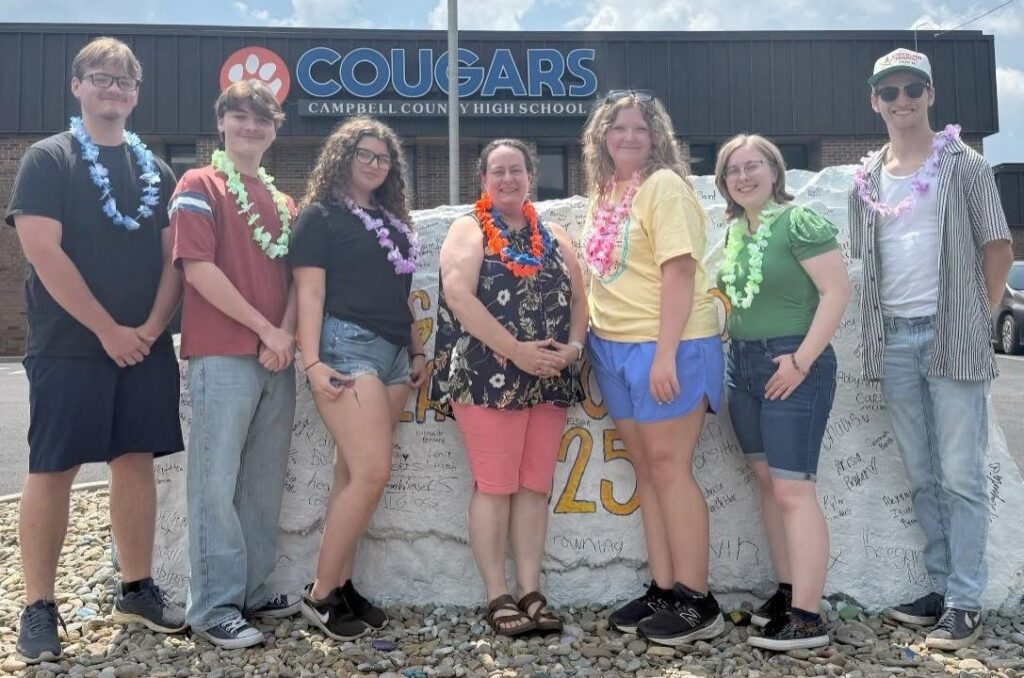
By Charlotte Underwood
JACKSBORO, TN (WLAF)- Six students at Campbell County High School have broken the mold by participating in the AP (Advanced Placement) Capstone Program and graduating, learning a higher level of research skills and better prepared for college and careers.
According to Campbell County High School senior Peyton Carroll, the AP Capstone Program gives “kids higher level research skills and the ability to understand research on a really high level, that you are not typically exposed to at a high school level.â€
Carroll, along with Cooper Sammons, Zoey Gildon, Amanda Mefford, Sophie Copeland, and Mekhi Gibson are CCHS’s first Capstone graduates, earning the Capstone Diploma, through an extensive and “rigorous†course of study.
According to CCHS AP Liaison Ann Browning, students in the program are required to complete AP Seminar as sophomores and then they can take AP Research Junior or Senior year.
“They actually design their own research project, they conduct their own research and then they have to analyze and present and defend their findings,†Browning said.
The Capstone Program was started by CCHS English Teacher Lisa Copeland around three years ago.
“So, Lisa did the research and agreed to do the rigorous training from College Board, so she is our Capstone Teacher, so Lisa facilitates the AP Seminar Class and AP Research, as well as two more AP English classes,†Browning said.
In addition to the AP Seminar and AP Research Class, students also must take four more AP classes and pass those exams to earn the Capstone Diploma.
According to Lisa Copeland, she first read about the Capstone program as a parent and became interested in it for her daughter Sophie and also thought it could benefit all students at CCHS.
“College Board sends emails to parents regarding what classes their students may want to take next, and in one email, I saw an interesting description of a program that allowed students to learn research skills and practice those skills while still in high school. With further research, I found that this would be a program that could easily be added to our already existing AP courses and would be beneficial in preparing students for other classes as well as benefiting students who planned to pursue AP classes,†Copeland said.
She then proposed the program to CCHS Principal Ben Foust.
“He was supportive from the start in both helping me find the funds for training and in starting and continuing the program for the past three years,†Copeland said.
Both classes require training for one week in the summer and then again in December. The training in December must be completed each year. The AP Capstone teacher teaches Seminar and/or Research, and the teacher must take and pass scoring calibration in order to score presentations for both classes.
According to Copeland, “students are asked to complete rigorous tasks in both Seminar and Research. In Seminar, students learn the basics of research by completing two Performance Tasks. The first is a group project that asks students to write individual research papers on a topic shared by the group and then present their findings as a group. The second task asks students to read and analyze a stimulus packet composed of at least six different articles, literary excerpts, and pieces of art. Students must then, individually, develop an argumentative topic and write an argumentative research paper and then present, individually, on the topic.â€
In the Research course, students develop their own research questions, determine a method to test and gather data, and draw conclusions about the topic and evidence. They then must prepare a 15-minute presentation to be presented to a panel of teachers, administrators, and/or experts.
“This sounds like a lot for students to accomplish, and it is, but after touring multiple colleges and universities in the state of Tennessee with my daughter, I found that every school requires students to complete either a research paper or presentation project their freshman year in the area of their degree. I knew that our students deserved the chance to learn these skills and better prepare for college and university life. This is an opportunity that few schools offer, and I knew our students were up to the challenge. They have yet to prove me wrong,†Copeland said. She reported that in the first year of Seminar CCHS students had a 77.8% pass rate. In the second year of Seminar, students had a pass rate of 96.4% compared to a global pass rate of 84.8%.
“Last year was our first year of Research, our students had an 85.7% pass rate compared to an 88.9% global pass rate,†Copeland said.
Peyton Carroll took the AP Research class in his junior year at CCHS.
“They have a research paper that is score by a college board and then they have to do an oral defense and an in-class presentation, and we also have a review board here on campus that has to review their topics of research and give them the go ahead before they can actually do that,†Browning said.
“Even with the introductory classes with seminar, it changes the way you think,†Carroll said. His research paper he wrote was around 6,000 words.
Caroll also got selected for a “fly-in program†where they fly students up to MIT in Boston for a visit.
“You get to stay with someone in your selected major for two days and you kind of get an experience of what MIT life is like,†Carroll said. His selected major is Aero Space Engineer.
If he gets into MIT, that is where he would like to obtain his degree. According to Carroll, the AP Capstone Program has helped him prepare for his future, both academic and in life.
“It’s great to just be exposed to those higher levels of ideas. It’s not just within the two Capstone classes themselves of Research and Seminar, but also, just AP classes in general, just challenging your brain to have to think does a lot for a person. It not only pushes you to be better academically, but as a person, it teaches you discipline, it teaches you responsibility, there’s a lot more that it teaches you than academics when you are taking these higher-level classes,†Carroll said. When he graduates at the end of this school year, he will have a whopping 14 AP classes “under his belt.â€
For senior Cooper Sammons, the program “prepared him for college and beyond.â€
“Through the Capstone Program I was able to get experience in research that will prepare me for college. The program taught me valuable skills in research that prepared me for future jobs. It also expanded my understanding of why education is important and why education across subjects is also important.” Sammons said.
Sophie Copeland said she was so glad the Capstone Program was provided for her at CCHS.
“It has challenged me to be more focused and encouraged my critical thinking skills and has allowed me to demonstrate my academic skills for colleges to review. But, most of all, it has provided me with credibility on my academic integrity due to how rigorous the program is and its demand of dedication, attention to detail, and time. I am so grateful for this achievement and to be able to share it with my future college,†Sophie Copeland said.
Campbell County High School offers nine AP classes on campus. Students also have access to additional online AP classes thanks to a partnership with the Niswonger Foundation, which through a partnership with the state, offers additional online classes to students free of charge.
Browning is the AP facilitator at the high school who acts as a liaison with the Niswonger Foundation. Her job is to “find students, enroll students, and support students as they work through that process because they have to do it online.†She also orders and administers all AP exams in May.
“The AP Capstone Program has really given our students more opportunities to take more classes that are specialized more towards their interests,†Browning said.
At the end of this school year, there will be an additional 16 students that should achieve their AP Capstone diplomas by the time they graduate. (WLAF NEWS PUBLISHED-09/22/2025-6AM-PHOTO COURTESY OF ANN BROWNING)

.jpg)